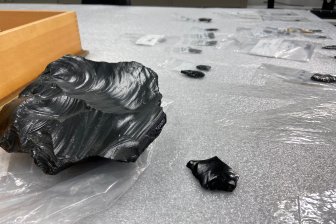Brain computer interface start-up Neuralink has begun its first human trial, according to the company’s billionaire co-founder Elon Musk.

In doing so, Neuralink has joined the ranks of other brain computer interface or “BCI” start-ups and researchers that are testing the technology on humans for a number of medical applications, such as restoring sight to the blind and allowing disabled people to interact with computers with their thoughts.
“The first human received an implant from Neuralink yesterday and is recovering well,” Musk wrote Monday on X, the social media platform formerly known as Twitter, which Musk purchased in 2022.
“Initial results show promising neuron spike detection,” Musk added without further detail.
Spikes are activity by neurons, which the National Institute of Health describes as cells that use electrical and chemical signals to send information around the brain and to the body.
In a follow-up post, Musk said the first product from Neuralink would be called Telepathy and would enable users to control their phone or computer with thoughts alone.
“Initial users will be those who have lost the use of their limbs,” Musk wrote. “Imagine if Stephen Hawking could communicate faster than a speed typist or auctioneer. That is the goal.”
The U.S. Food and Drug Administration gave Neuralink the green light to conduct its first human trial in September 2023.
The Neuralink implant consists of a transmitter attached to ultra-fine “threads” that record neural activity. The implant is surgically inserted into a patient’s brain by a robot because the implant threads are so fine “that they can’t be inserted by the human hand,” according to the start-up’s website.
The implant transmits the electrical signals picked up by the threads wirelessly to the “Neuralink Application,” which decodes that brain activity into actions, like moving a mouse on a computer screen. This is how BCIs can “read thoughts.” Typically, these technologies use artificial intelligence, or machine learning models, to help identify which brain signals correspond to which actions.
Neuralink is far from the only company working on these kinds of brain chips, and most of the advancements in this emerging field have been accomplished in academic settings. BCI technology has been researched and advanced by scientists for decades, but a recent wave of investment from venture capitalists has pushed the field forward rapidly in the past few years.
BCI start-up Synchron beat Neuralink to human clinical trials with its brain chip in July 2021. In a promotional video on its website, the company says that its “brain bluetooth” has already allowed two people experiencing paralysis to email, text, shop and bank on their own.
Onward Inc., a company specializing in spinal cord implants to treat paralysis, recently partnered with Swiss scientists on a study that resulted in all paralyzed participants being able to take steps on a treadmill the day after their surgeries.
Neuralink is also not without controversy. The use of animals in Neuralink’s product testing angered animal activists, especially after the company acknowledged that a monkey had died during testing.
Four lawmakers in late November asked the U.S. Securities and Exchange Commission to investigate whether Musk had misled investors about the safety of Neuralink’s technology after veterinary records showed problems with the implants on monkeys included paralysis, seizures and brain swelling.
Musk wrote in a social media post on Sept. 10 that “no monkey has died as a result of a Neuralink implant.” He added that the company chose “terminal” monkeys to minimize risk to healthy ones.
Reuters reported earlier this month that the company was fined for violating U.S. Department of Transportation (DOT) rules regarding the movement of hazardous materials.
— With files from Reuters







Comments